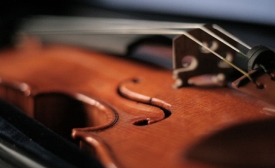music diplomacy
State Department work doesn’t just involve diplomats and briefcases. U.S. cultural diplomacy sent “jazz ambassadors” such as Dizzy Gillespie and Louis Armstrong overseas at the height of the Cold War in the 1950s and 1960s. The programs and cultural exchanges have only expanded since.
Very few American fans can see K-pop acts perform live. Some popular South Korean bands like Girls' Generation or 2NE1 have played showcases in major U.S. cities, and the girl group Crayon Pop just toured with Lady Gaga. Yet for most such acts, it's never made logistical or financial sense to play the States, despite a fervent fan subculture here. This year's KCON, the third installment of the annual K-pop festival in downtown L.A., might be changing that line of thinking.
The young men doing the serenading are part of the Mexico Boys Choir, which travels to Fort Worth every summer in a musical and cultural exchange with the Texas Girls’ Choir. In their homeland, the boys are known as the Estudiantina Guadalupana Potosina. The youngsters have been involved in the exchange for more than two decades.
Every year, the State Department and nonprofit groups help send musical troupes, dance groups and teachers abroad to promote American culture and generate goodwill. It’s all part of cultural diplomacy, an idea that got its start with the “jazz ambassadors” at the height of the Cold War in the 1950s and 1960s.
What do the U.S., Argentina, Afghanistan, and Myanmar have in common? This summer, two opportunities enabled me to explore this question from my perspective as an American violinist who recently moved to Argentina from Afghanistan.

An American violinist and cultural diplomat explores the unifying power of music.
"The Newport Jazz Festival is the finest celebration of jazz that the music world has to offer," said John Hailer, president and chief executive officer, Natixis Global Asset Management - The Americas and Asia. "In celebration of this year's anniversary, we launched the 2014 Jazz Diplomacy Project to share the history of jazz and explore the lessons the world has learned through the genre.
On a recent spring day in Rugodiv auditorium in Narva, a city on Estonia’s eastern border with Russia, 280 children are singing: “This is what I hear/ This is what I see/ This is what I feel/ This is my homeland.” Standing shoulder to shoulder, they all sing in Estonian, a surprise in this Russian enclave of 58,600 on the dividing line between the European Union and the Russian Federation.







